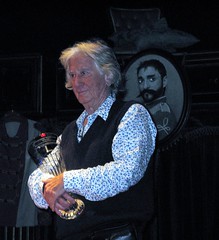Cornelius Kibelka somehow got on the last flight from Europe to Brazil before they closed the border earlier this year. Upon arrival he was greeted by a São Paulo under lockdown, and a nation deeply divided about how to deal with a virus along political lines.
Today on the podcast he tells us what he is seeing, feeling and hearing in the most populous city in Brazil and what it all might mean for the weeks and months to come.
Tag Archives: brazil
Old Presidents

Over the past 3 weeks I have been in Portugal helping my grandparents with daily life during a trying series of complications that often come with old age. During that time Ive strangely found myself watching television, specifically programming from the more intellectual Portuguese state television RTP2. While washing dishes one night I heard a familiar Brazilian accent and looked over at what was a clearly older and slightly weaker Lula da Silva. The former 2 term Brazilian president was being interviewed about his life, his presidency, his country, and the world in general. He spoke about how his thinking has been impacted by his successful battle against throat cancer. He spoke about injustice and inequality in different parts of the world, including in Brazil. And most impressive for me, he spoke with a clarity and wisdom you’re rarely allowed to see in the world of international politics.
This got me to thinking about the wisdom and freedom to speak that comes with no longer being the leader of a nation. Every now and then, a president or a prime minister steps down, and suddenly it is like a weight has been lifted and a light shines upon them. In the United States, Jimmy Carter has long been the voice of unwavering criticism and honesty about the state of the world and the shortcomings of is own presidency. Nor he or Lula are the first of their kind, but listening to someone who led such a large and dynamic nation during a period of such immense change, in addition to having survived the near loss of his voice (and life), is quite enlightening.
Critics will say – he (and all former leaders) are still and always will be politicians. Lula himself says this. But the office of the executive seems so often to paralyze and silence the true voice of the person elected to that position. Perhaps you can’t speak truth to power when you are the power. But if anyone in this world were looking for useful information based on unique and qualified experience, look for the former presidents who still care about the world and have finally found the nerve to tell it like it is. They can help advise both leaders and citizens of this world, to learn from their mistakes, and look critically at how our world is being run.
Note: I will subtitle the interview and post it in the coming week as a video entry.
Augusto Boal Interview
 I admit that during his life I didn’t know everything about Augusto Boal and his work for social justice and human rights. I should have, because now only a few days after his death, it is clear he was my kind of guy; someone who’s life is an example to many of us.
I admit that during his life I didn’t know everything about Augusto Boal and his work for social justice and human rights. I should have, because now only a few days after his death, it is clear he was my kind of guy; someone who’s life is an example to many of us.
DemocracyNow recently played an old interview with Boal from 2007, I would highly recommend you listen to his words, they’re brief but meaningful.? Also I wanted to include my favorite part of the interview which is better in audio format, but for those who prefer to read:Continue reading “Augusto Boal Interview”
Dr. M Goes Swedish
Longtime blogreaders might remember my good friend Crazy Dr. M., Californian turned Amsterdamer years and years ago. And after many wonderful years and countless barbecues, the good Dr. is taking a job up in Umea, Sweden. Home to another good friend. (remember when I went to visit in 2005?)
As we celebrated his departure today, he began telling me of an upcoming trip to a place called Sergipe, Brazil. (pronounce it, ser-jee-pee) He asked me if I knew anything about it, and until tonight, I didn’t.
Apparently Sergipe is a pretty untouched state, lots of savannah is nature in general. But as Dr. M was telling me, they’ve got plans to build new cities and other development. Which eventually led us to another discussion that I’ve often heard in the last year: A state like Sergipe produces sugar cane. If Brazil and other countries of the world start to push for ethenol/fuels that are made from sugar, that means more sugar cane plantations will be needed and more land will be cleared. IRONIC. In an effort to do something responsible for the environment, this would serve to destroy more natural habitats, forests, jungles, etc. And from the way the bigshots like the presidents of Brazil and the US seem to be talking, this is exactly what will happen… big money for sugar and corn based fuels.
People always say, well, we have to try something. I’m all for action, but demand some serious analysis and more responsible policies.
